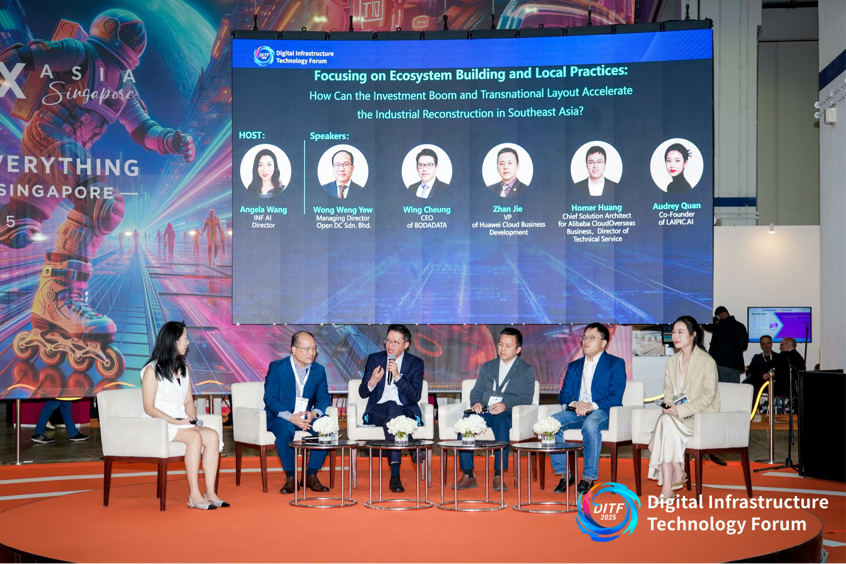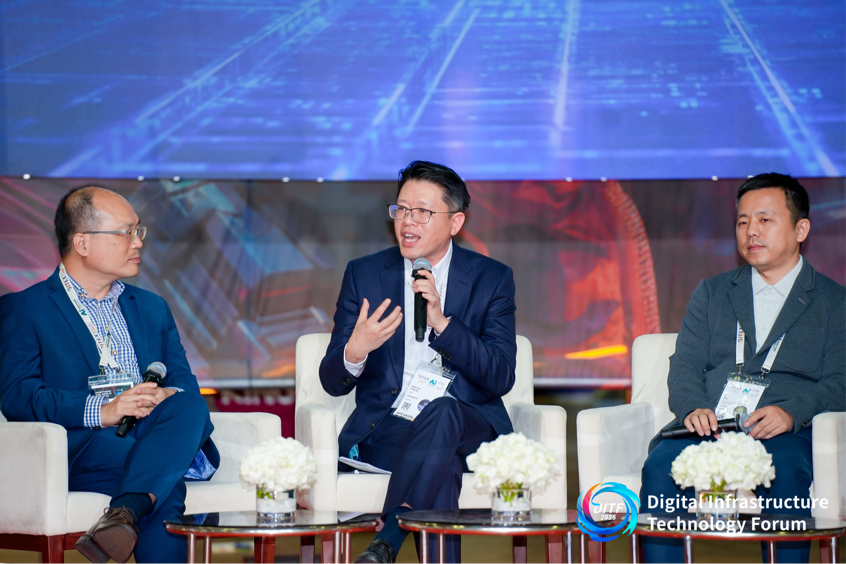BodaData Strengthens Southeast Asia Expansion with Localized Strategy and Ecosystem Collaboration
BodaData took center stage at the China–Southeast Asia Digital Infrastructure Cooperation Forum, held in Singapore. Company Chairman Mr. Wuwang Yu, CEO Mr. Wing Cheung, and Board Secretary Mr. Eric Chan were invited to participate. As part of the program, CEO Wing Cheung joined a high-level roundtable discussion titled “Ecosystem Co-Building and Localization: How Investment Waves and Multinational Expansion Are Reshaping Southeast Asia.”
Drawing on BodaData’s deployment of its hybrid data center in the Philippines, Wing shared practical insights on how multinationals can build sustainable competitiveness in Southeast Asia by balancing strategy, operations, and local practice.

From Mission to Model: Full-Lifecycle Strategy Anchored in Purpose
Wing emphasized that for companies entering Southeast Asia, the first step is to clarify their mission: “Short-term value creation and long-term operational sustainability must go hand in hand.” He noted that companies must determine whether their primary goal is to deliver quick returns for investors or to build a stable, dividend-generating long-term presence—this choice fundamentally shapes capital allocation, business priorities, and partnership strategies.
In the project of the Philippines, BodaData’s goal is “serving local demand while evolving into a regional hub.” As the second-most populous country in Southeast Asia, the Philippines offers sufficient demand to support standalone hybrid data center operations. Moreover, with 20–30 new subsea cable landings planned over the next few years, the country is well-positioned to become a bridge between Southeast Asia and China.
This “one country, multiple capabilities” positioning requires flexible operational models. “If the model is ‘one country, one market,’ it must rely heavily on local teams and supply chains. If the model is ‘one country serving multiple markets,’ it needs to integrate regional talent and cross-market resources,” Wing explained.
BodaData has adopted a “Chinese knowledge export + localized operation” approach: leveraging the technical strengths of partners to build high-spec facilities, while collaborating with local telecom operators to ensure deep integration into the regional digital ecosystem. “Ultimately, choosing an operational model is about balancing efficiency and risk,” Wing added, noting that companies must adapt their strategies to the maturity of local regulations, supply chains, and market needs.

Localized Execution: From Infrastructure to Talent Development
Southeast Asia’s market fragmentation presents added complexity. Wing pointed out that countries like Indonesia and the Philippines are transitioning from traditional colocation to cloud computing, while Malaysia and Thailand are beginning to explore AI-powered, high-density computing. “Companies must assess each market’s maturity precisely to avoid premature deployment or lagging adaptation,” he warned.
To address this, BodaData has implemented a “phased adaptation” strategy in the Philippines: Phase 1: Focus on basic compute and cloud services to meet immediate digitalization needs. Phase 2: Introduce AI-driven intelligent operations (AIOps) to boost efficiency. Phase 3: Integrate with regional subsea cable networks to expand cross-border connectivity.
This approach avoids the risks of a “one-size-fits-all” tech stack and offers clients a pathway for gradual digital upgrades.
Talent and compliance are also vital to localization. Southeast Asia faces a shortage of technical professionals—especially in data center design and AI operations. To address this, BodaData follows a “dual-track” model of HQ enablement and local development: Deploying experienced Chinese teams to establish the technical foundation. Partnering with University of Makati to offer customized training for local engineers. A joint China–Philippines management team was also formed to uphold global operational standards while empowering local teams with agile decision-making. “Cultural differences are not barriers—they’re sources of innovation,” Wing noted, adding that this approach reduces costs while accelerating team localization.
In terms of compliance, BodaData extends its modular design philosophy to legal and operational frameworks. For example, to meet the requirements of the Philippines’ Data Privacy Act, the company deploys customizable security protocols and localized data storage solutions. “Compliance is the foundation of trust,” Wing emphasized, adding that this strategy has helped the company gain both government and enterprise recognition in the local market.
Ecosystem-Driven Growth: From Supply Chains to Sustainability
“Southeast Asia’s digital future can’t be built in isolation,” Wing said. Deep collaboration across the value chain is key to overcoming regional fragmentation. BodaData’s three-pronged approach to ecosystem building includes: Co-developing technology alliances with partners like ZTE and Huawei to share innovations in AIOps and liquid cooling; Integrating local suppliers to shorten procurement cycles and reduce supply chain disruption; Collaborating with governments and industry organizations to promote green policy implementation.
In the Philippines, the Hybrid Data Center was designed from inception to include solar power systems, and BodaData partnered with local NGOs to conduct digital literacy training in the surrounding community. “Green transformation isn’t a cost—it’s a competitive advantage,” Wing asserted.
The center has become a regional benchmark for intelligent infrastructure and is now attracting cross-border partnership inquiries from multinational clients. “The Philippines AI Data Center is just the first piece of BodaData’s regional puzzle,” Wing concluded. The company aims to build a full-stack infrastructure network spanning AI compute, cross-border connectivity, and vertical solutions.
He emphasized that Chinese companies’ strengths in tech iteration and scaled execution can complement Southeast Asia’s localized demand—“The key is to enter with humility, let global tech resonate with regional insight.”
Empowering the Region Through Partnership
As Southeast Asia accelerates its digital transformation, BodaData is positioning itself not just as an infrastructure provider, but as a digital ecosystem enabler.
Through technology sharing, ecosystem collaboration, and co-created value, BodaData is working hand-in-hand with Southeast Asian partners to shape a smarter, more inclusive digital future.
推荐资讯
more- 把时间写进算力|博大数据的2025年度答卷
- 「见·圳」前海,智算未来。
- 《雷峰网》专访:博大数据 CEO 张永健:资本追逐、政策红利、人才短缺,东南亚智算市场是机会还是陷阱?丨智算想象力十人谈
- 聚焦2025服贸会:以智算沃土助力构建超级智能体,打造AI时代的“数字世界引擎”
- 博大数据获合作伙伴高度认可,圆满完成抗战胜利80周年特别节目安全播出保障任务
- 以全栈算力筑基AI未来,博大数据重磅亮相2025世界人工智能大会
- GiTex in Singapore 2025 0424
- 点亮数字里程,擎动算力未来:HIVE菲律宾融合智算中心开园在即
- 以“1”为基,步履不停
- 匠人精神成就卓越算力,博大数据荣膺“2024 APCA AWARD”双料大奖


